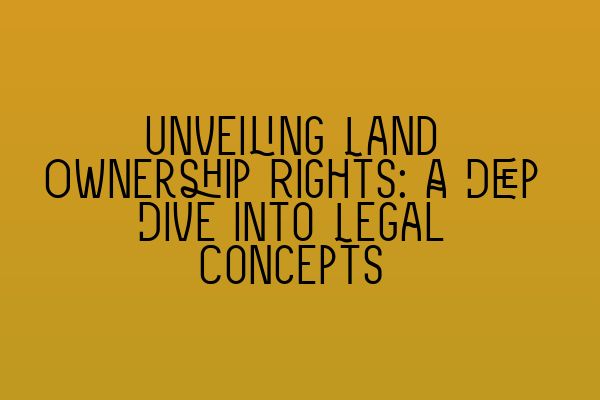Unveiling Land Ownership Rights: A Deep Dive into Legal Concepts
As we navigate the intricacies of property law, it is essential to understand the legal concepts behind land ownership rights. Whether you’re a solicitor, property owner, or simply interested in expanding your legal knowledge, this deep dive into land ownership rights will provide valuable insights into the complex world of property law.
1. Freehold vs. Leasehold Tenure
When discussing land ownership rights, it’s crucial to differentiate between freehold and leasehold tenure. Freehold ownership grants the owner complete and absolute rights over the land, while leasehold ownership provides limited rights for a specified period of time.
2. Estates in Land
Within freehold tenure, there are different types of estates in land that determine the extent of ownership rights. The two primary types are fee simple absolute and life estate. Fee simple absolute grants the owner the most extensive rights, while a life estate limits ownership to the owner’s lifetime.
3. Legal Title and Equitable Interest
In property law, legal title refers to the formal ownership recognized by the law, while equitable interest represents the beneficial interest in the property held by someone other than the legal owner. Understanding the distinction between legal title and equitable interest is crucial when examining land ownership rights.
4. Co-Ownership
Co-ownership refers to multiple individuals sharing ownership of a property. There are two primary forms of co-ownership: joint tenancy and tenancy in common. Joint tenancy includes the right of survivorship, meaning if one owner passes away, their share automatically passes to the surviving owners. Tenancy in common, on the other hand, allows each owner to have a distinct share that they can pass on to their heirs.
5. Easements and Covenants
Easements and covenants are important concepts that affect land ownership rights. An easement grants someone the right to use a portion of another person’s land, such as a right of way. Covenants, on the other hand, are agreements between landowners to abide by certain restrictions, such as maintaining a specific architectural style or prohibiting certain activities.
6. Adverse Possession
Adverse possession refers to the legal principle that allows someone to acquire ownership of another person’s land through continuous and open possession for a specified period of time. This concept can be complex and often involves meeting specific legal requirements, such as occupying the land without permission and treating it as their own.
7. Registration and Land Charges
In the UK, land ownership rights are typically registered with the Land Registry. Registering property provides legal certainty and protects ownership rights. Additionally, land charges, such as mortgages or leases, can be registered against a property to secure financial interests.
8. Common Law vs. Statutory Rights
Land ownership rights can be derived from both common law and statutory law. Common law principles, developed through court decisions and legal precedents, govern various aspects of land ownership. Statutory rights, on the other hand, are derived from legislation enacted by Parliament.
9. The Role of a Property Law Solicitor
Navigating land ownership rights can be complex, which is why seeking the guidance of a knowledgeable property law solicitor is crucial. A solicitor can assist with various aspects, including property transactions, resolving disputes, and ensuring compliance with legal requirements.
Conclusion
Understanding land ownership rights is essential for navigating the complex world of property law. Whether you’re a solicitor, property owner, or enthusiast, this deep dive into legal concepts provides valuable insights into the intricacies of land ownership. By grasping the various concepts discussed, you can make informed decisions, protect your rights, and confidently navigate the realm of property law.
Related Articles:
– SQE 1 Practice Exam Questions
– SQE 1 Practice Mocks FLK1 FLK2
– SQE 2 Preparation Courses
– SQE 1 Preparation Courses
– SRA SQE Exam Dates
